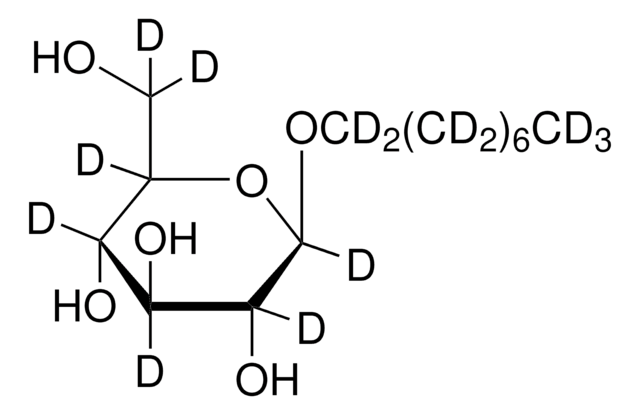494459
n-Octyl-β-D-glucopyranoside
CAS 29836-26-8 is a non-ionic detergent intended for solubilizing membrane-bound proteins in their native state and for the preparation of lipid vesicles.
Synonym(s):
n-Octyl-β-D-glucopyranoside, OG, n-Octylglucoside
About This Item
Recommended Products
Quality Level
Assay
≥98% (HPLC)
form
solid
manufacturer/tradename
Calbiochem®
storage condition
OK to freeze
desiccated (hygroscopic)
aggregation number
84
impurities
≤0.05% n-octanol
≤35 mg/dL glucose
color
white
CMC
20 - 25 mM
solubility
water: 100 mg/mL
shipped in
ambient
storage temp.
15-25°C
InChI
1S/C14H28O6/c1-2-3-4-5-6-7-8-19-14-13(18)12(17)11(16)10(9-15)20-14/h10-18H,2-9H2,1H3/t10-,11-,12+,13-,14-/m1/s1
InChI key
HEGSGKPQLMEBJL-RKQHYHRCSA-N
General description
Application
- Tube-gel digestion: a novel proteomic approach for high throughput analysis of membrane proteins.: This article introduces a new method for analyzing membrane proteins using tube-gel digestion, which employs n-Octyl-β-D-glucopyranoside for effective solubilization of membrane proteins. This approach enhances the throughput and efficiency of proteomic analyses (Lu et al., 2005).
- Mixed micellization of a nonionic-cationic surfactant system constituted by n-octyl-beta-D-glucopyranoside/dodecyltrimethylammonium bromide/H2O.: The study explores the micellization behavior of a nonionic-cationic surfactant system involving n-Octyl-β-D-glucopyranoside and its interactions. The findings are significant for understanding surfactant properties and applications in biochemical processes (del Burgo et al., 2004).
Warning
Reconstitution
Other Notes
Levy, D., et al. 1992. Biochim. Biophys. Acta1107, 283.
Nunn, R.S., et al. 1992. J. Mol. Biol.228, 1259.
Lorber, B., et al. 1990. Biochim. Biophys. Acta1023, 254.
Jopski, B., et al. 1989. Biochim. Biophys. Acta978, 79.
Camm, E.L., et al. 1981. Plant Physiol.67, 1061.
Gould, R.J., et al. 1981. Biochemistry20, 6776.
Legal Information
Storage Class Code
13 - Non Combustible Solids
WGK
WGK 3
Flash Point(F)
Not applicable
Flash Point(C)
Not applicable
Certificates of Analysis (COA)
Search for Certificates of Analysis (COA) by entering the products Lot/Batch Number. Lot and Batch Numbers can be found on a product’s label following the words ‘Lot’ or ‘Batch’.
Already Own This Product?
Find documentation for the products that you have recently purchased in the Document Library.
Customers Also Viewed
Our team of scientists has experience in all areas of research including Life Science, Material Science, Chemical Synthesis, Chromatography, Analytical and many others.
Contact Technical Service







